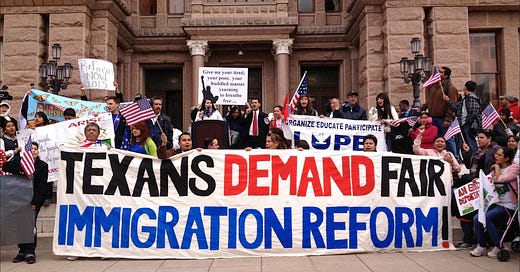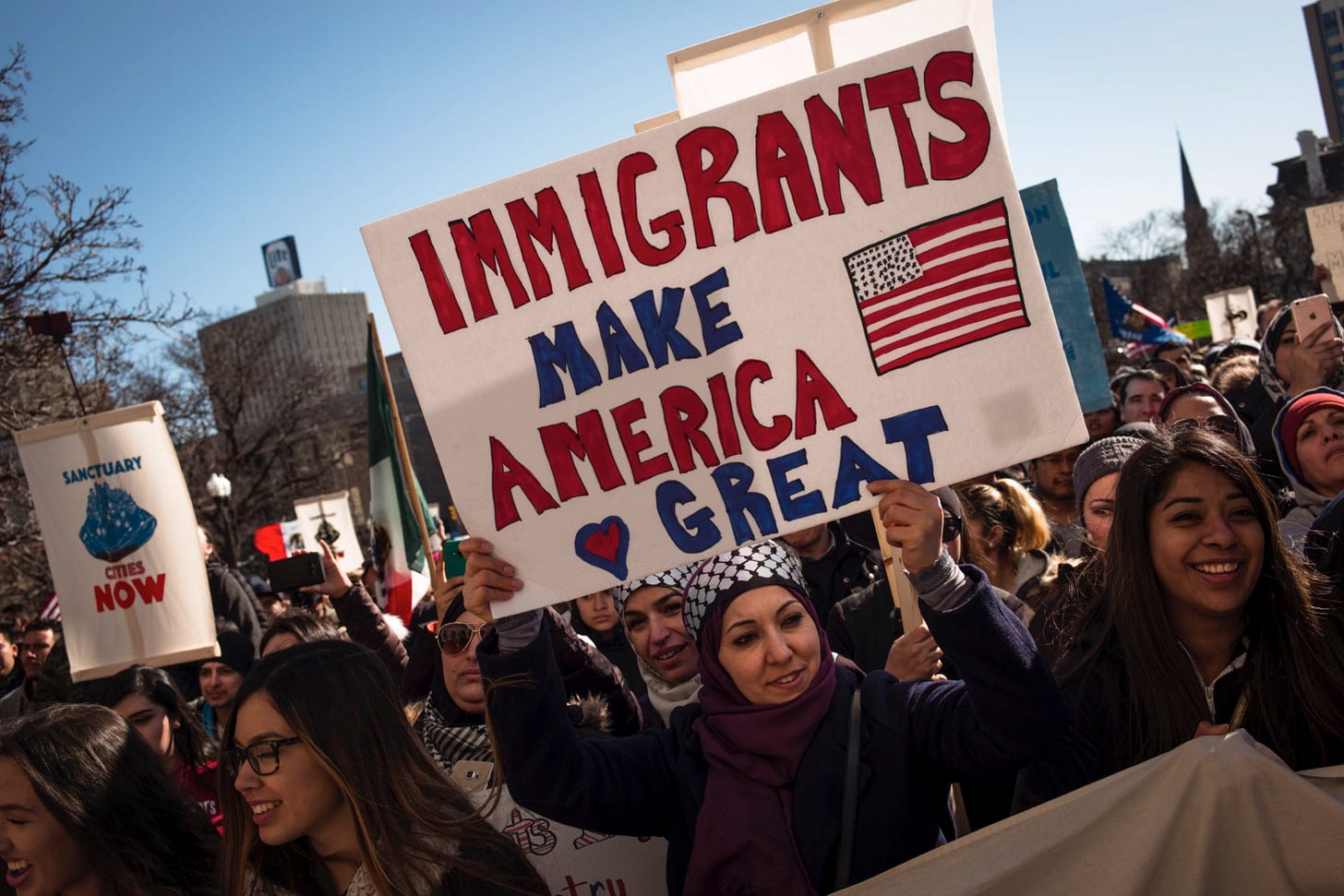Toward a Just and Effective Immigration System: A Vision for Comprehensive Reform
The promise of America can only be fulfilled when we ensure that all who come here seeking a better life are met not with cruelty, but with justice, compassion, and a path forward.
Toward a Just and Effective Immigration System: A Vision for Comprehensive Reform
Introduction: A Nation at a Crossroads
America’s immigration system stands at a critical juncture. Decades of political inaction, rising global displacement, and deepening polarization have left the United States with an immigration framework that is outdated, inefficient, and often inhumane. Public discourse has frequently reduced the issue to slogans—“build the wall” or “abolish ICE”—but actual progress requires nuanced, compassionate, and pragmatic policymaking. A comprehensive immigration reform package must be rooted in global migration's realities and the enduring American values of fairness, opportunity, and the rule of law.
Such reform must address four interconnected pillars: effective and adequate border security, a humane solution for undocumented immigrants already in the country, a modernized and more responsive legal immigration system, and a just, efficient approach to asylum. Together, these elements can form the foundation of an immigration policy that enhances national security, respects human rights, and reinforces America’s identity as a nation of immigrants.
Border Security That is Smart, Not Cruel
Securing the border is a legitimate and necessary function of any sovereign state. But border security must not be confused with militarization, racial profiling, or punitive deterrence strategies. Instead, it should be part of a broader strategy that is technologically advanced, cost-effective, and respectful of civil liberties.
Comprehensive reform would invest in modern surveillance technology such as drones, sensors, and biometric systems rather than expanding physical walls in ecologically sensitive or ineffective areas. It would also increase staffing and training for Customs and Border Protection (CBP) to emphasize professional conduct and de-escalation. Border infrastructure improvements—such as better roads, humanitarian stations, and processing centers—would help manage lawful traffic and support emergency needs.
A smart border also means addressing the root causes of migration from Central America, Haiti, and elsewhere. Aid and diplomatic initiatives to improve governance, security, and economic opportunity in sending countries must be a central plank in any long-term security strategy.
A Pathway to Citizenship for Undocumented Immigrants
Over 10 million undocumented immigrants currently reside in the United States—many of them having lived, worked, and raised families here for years or even decades. Deporting this population en masse is not only logistically and economically unfeasible; it is morally indefensible.
Comprehensive reform must provide these individuals with a transparent, fair, and achievable pathway to citizenship. This pathway should involve background checks, proof of long-term residence, English language acquisition, payment of legitimate taxes, and a waiting period, balancing accountability with dignity and opportunity.
Special consideration should be given to Dreamers (those brought to the U.S. as children), Temporary Protected Status (TPS) holders, and farmworkers—populations who have already demonstrated significant contributions to the country. Legislation like the DREAM Act, Farm Workforce Modernization Act, and U.S. Citizenship Act offer valuable blueprints.
Bringing the undocumented population out of the shadows would affirm America’s commitment to justice and family unity and strengthen the economy and national security through better integration and compliance.
Fixing the Legal Immigration System
America’s legal immigration framework is riddled with backlogs, arbitrary quotas, and outdated preferences. It is neither responsive to labor market needs nor aligned with family unification goals. Reform should prioritize efficiency, flexibility, and fairness.
First, the number of employment- and family-based visas in the present quota-based system should be increased to reflect demographic and economic realities. Reallocating unused visas from prior years and exempting immediate family members of permanent residents from quotas could significantly reduce backlogs.
Second, the H-1B and other employment visa systems should be reformed to prevent exploitation, promote worker mobility, and ensure a match between visa allocations and actual workforce needs. For essential sectors like agriculture, caregiving, and technology, streamlined programs with labor protections would help meet demand while preventing undercutting of wages.
Third, green card pathways should be expanded for international students graduating from U.S. institutions, and the diversity visa program should be preserved to maintain global equity in access.
Finally, digitizing the immigration system—long plagued by paper-based inefficiencies—would dramatically improve processing times and public confidence.
Restoring Integrity and Humanity to Asylum and Refugee Policies
The right to seek asylum is enshrined in U.S. and international law, yet the system for adjudicating asylum claims has become overwhelmed and deeply politicized. Reform should aim to restore due process, enhance capacity, and ensure humane treatment of vulnerable populations.
To start, the U.S. must increase the number of asylum officers and immigration judges, while ensuring they receive training in trauma-informed interviewing and human rights law. This would reduce the overwhelming backlog and improve decision quality.
Reform should also include the expansion of legal representation for asylum seekers, especially children and those with language barriers. Community-based case management programs—rather than costly and dehumanizing detention—have proven effective at ensuring compliance and attendance at hearings.
The U.S. should restore and expand resettlement numbers for refugees abroad, which have been slashed in recent years. Coordinating with international agencies and non-governmental organizations can streamline the vetting process while reaffirming America’s moral leadership on the global stage.
Reclaiming America’s Immigration Promise
Comprehensive immigration reform is not just a policy goal but a moral imperative. At its best, America is a beacon of hope for those seeking safety, opportunity, and a better life. At its worst, it has been a place of exclusion, cruelty, and broken promises. We now have the chance to choose a better path that recognizes the humanity of migrants, the necessity of secure borders, the value of legal immigration, and the dignity of those seeking refuge.
Passing comprehensive reform will require political courage and civic will. It will mean rejecting xenophobic rhetoric and fear-mongering in favor of data, compassion, and our shared national interest. The time for piecemeal fixes and performative outrage has passed.
Let us call upon our elected leaders—and ourselves—to rise to the occasion. Let us craft an immigration system worthy of our values, history, and future. The promise of America can only be fulfilled when we ensure that all who come here seeking a better life are met not with cruelty, but with justice, compassion, and a path forward.
We can and should be much better.
If Thinking Deeply touches you. If it motivates you to take action. If you find my writing helpful. Please share it with others. Ask them to subscribe to Thinking Deeply. Remember, all subscriptions to Thinking Deeply are free.
If you have thoughts worthy of sharing on my articles, please add them as comments.





